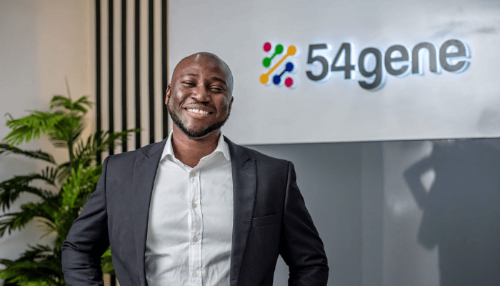Court Blocks Sale of 54gene Assets Amid Founder-Investor Legal Battle

TLDR
- A Federal High Court in Lagos has issued an injunction halting the sale of assets belonging to 54gene, the Nigerian genomics startup once seen as a pioneer in African biotech
- The court action stems from a legal petition filed by Dr. Abasi Ene-Obong, the company’s founder and former CEO
- The assets slated for sale included sensitive genomic data from 100,000 Nigerians, reportedly priced at $3 million
A Federal High Court in Lagos has issued an injunction halting the sale of assets belonging to 54gene, the Nigerian genomics startup once seen as a pioneer in African biotech. The court action stems from a legal petition filed by Dr. Abasi Ene-Obong, the company’s founder and former CEO, who accuses major investors of orchestrating the company's collapse and attempting to dissolve it without accountability.
The assets slated for sale included sensitive genomic data from 100,000 Nigerians, reportedly priced at $3 million. Ene-Obong argues that this sale, and the events leading up to it, breach ethical and fiduciary duties to research participants, shareholders, and Nigerian communities.
54gene was once valued at $170 million, backed by prominent global investors including Adjuvant Capital and Cathay AfricInvest Innovation Fund. However, it shut down in 2023 following sharp revenue declines post-COVID, failed fundraising attempts, and internal governance breakdowns.
The court’s decision delays any dissolution or asset transfer until the case is resolved, placing a spotlight on one of the most dramatic startup failures in Africa’s tech ecosystem.
Daba is Africa's leading investment platform for private and public markets. Download here
Key Takeaways
The unraveling of 54gene—once a symbol of Africa’s biotech potential—raises pressing questions about investor governance, founder rights, and data sovereignty in African startups. At the heart of the dispute is a power struggle between Ene-Obong and preferred shareholders Adjuvant Capital and Cathay AfricInvest, who held 29.4% of the company and allegedly assumed control following his resignation in 2022. Ene-Obong claims the investors rejected multiple rescue offers—including an $80 million capital injection and a $35 million acquisition proposal—while implementing terms that guaranteed them a 4× liquidation preference, sidelined common shareholders, and forced the company into bankruptcy. The case highlights the fragile corporate governance structures that can emerge when African startups raise capital through complex offshore vehicles. While 54gene’s holding company was incorporated in the U.S., its operations, assets, and value—including a national biobank and genomic IP—resided in Nigeria.

Next Frontier
Stay up to date on major news and events in African markets. Delivered weekly.
Pulse54
UDeep-dives into what’s old and new in Africa’s investment landscape. Delivered twice monthly.
Events
Sign up to stay informed about our regular webinars, product launches, and exhibitions.




